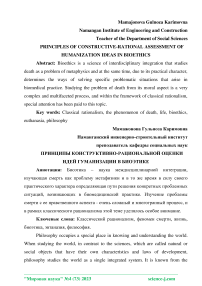Principles of constructive-rational assessment of humanization ideas in bioethics
Автор: Mamajonova G.K.
Журнал: Мировая наука @science-j
Рубрика: Основной раздел
Статья в выпуске: 4 (73), 2023 года.
Бесплатный доступ
Bioethics is a science of interdisciplinary integration that studies death as a problem of metaphysics and at the same time, due to its practical character, determines the ways of solving specific problematic situations that arise in biomedical practice. Studying the problem of death from its moral aspect is a very complex and multifaceted process, and within the framework of classical rationalism, special attention has been paid to this topic.
Classical rationalism, the phenomenon of death, life, bioethics, euthanasia, philosophy
Короткий адрес: https://sciup.org/140299360
IDR: 140299360
Текст научной статьи Principles of constructive-rational assessment of humanization ideas in bioethics
Philosophy occupies a special place in knowing and understanding the world. When studying the world, in contrast to the sciences, which are called natural or social objects that have their own characteristics and laws of development, philosophy studies the world as a single integrated system. It is known from the history of philosophy that since ancient times man did not consider himself separate from the universe. Because even at that time, its existence was considered to be in harmony with nature. Nature is perceived as a symbol of excellence. Thus, the human form is indestructible, inseparable and inseparable from nature. This stage of the development of medical ethics is characterized by such a process as the synchronization of the image of the person with nature. Therefore, at this stage, the famous "Oath" of Hippocrates, regardless of social or other situation, reflected the human attitude that depends on the person and his personality.
The transformation of the human image has also changed medical ethics, which is a component of social ethics. In the medical ethics of the neo-humanist, the image of the individual has a transformational character. In the 20th century, advances in medicine continued to develop: psychopharmacology, kidney dialysis, organ transplants, safe medical abortion, birth control, prenatal diagnosis, the widespread use of intensive care and artificial ventilation, the drastic change of dying at home to hospital or other aspects, the first problems of genetic engineering and others are included.
Biomedical advances and their technological applications have also changed traditional perceptions of human nature and the possibilities of medicine. For example, medical diagnosis has become a tool that radically changes the course of disease and delays death. Society's reaction to such clear ideas about human life gave rise to the field of bioethics. Today, medical biotechnology is rapidly developing all over the world, for example, in some countries, such as Japan, it has been declared a "strategic industry". M. Khyauryu divides the issue of values in the field of bioethics into two types: pragmatic or consequentialist, that is, deontological or absolute judgments that are independent of the possible results of one or another biotechnological procedure, as well as the consequences of the subject of discussion.
In conclusion, it can be said that bioethics knowledge has a complex structure and is characterized by interaction with different forms of knowledge, which allows to distinguish between internal and inter-systemic aspects when considering the science of bioethics. In the modern system of knowledge, bioethics is manifested at the level of scientific and philosophical fundamental knowledge. This position of bioethical knowledge is related to its interdisciplinary and inseparable nature, as well as to the understanding of the most complex relationships that are currently implemented in the interaction of a person with objects of living nature. Bioethics as a field of knowledge combines elements of various sciences (categories, laws, principles, concepts, etc.) and non-scientific forms of knowledge (religion, mysticism, art, philosophy). In the science of bioethics, the principle of integration manifests itself as a human being as the central object and subject of moral relations.
Список литературы Principles of constructive-rational assessment of humanization ideas in bioethics
- Ergashev, A. EXPERIENCE OF FOREIGN COUNTRIES AND UZBEKISTAN IN DEVELOPMENT OF SMALL BUSINESS.
- Ergashev, A.( 2022) Legal basis and foreign experience in assessing the capital of commercial banks / A. Ergashev // - No. 4(108). - P. 82-86.
- Эргашев, А. М. (2017). Ўзбекистонда кичик бизнес ва оилавий тадбиркорликни молиявий институтлар томонидан қўллаб-қувватланиши. Иқтисодиёт ва таълим, 8(6), 106.
- Эргашев, А. М. (2016). Аҳоли фаровонлигини таъминлашда оилавий тадбиркорликнинг ўрни ва аҳамияти. Тежамкорликнинг концептуал асослари ва унинг ижтимоий-иқтисодий шарт-шароитлари, 2(174), 254.
- Мухаммадиев, К. Б., & Мухаммадиева, Д. А. (2018). Технология организации и проведения спортивных и физкультурных мероприятий в зонах с жарким климатом. In Информационно-образовательные и воспитательные стратегии в современной психологии и педагогике (pp. 191-193).
- Мухаммадиев, К. Б. (2013). Технология организации занятий спортом и физической культурой в условиях жаркого климата. In Актуальные проблемы современной педагогики (III). Международная научная конференция (pp. 161-163).
- Мухаммадиев, К. Б. (2013). Физическая культура и спорт как фактор оздоровления студентов. Актуальные проблемы современной науки, (1), 82-84.
- Mukhammadiev, K. B., Mirzakulov, I. M., & Karimov, A. H. (2022, June). Methodological fundamentals of formation of ecological culture in students. In AIP Conference Proceedings (Vol. 2432, No. 1, p. 030054). AIP Publishing LLC.
- Burkhonovich, M. K. (2021). Physical education and sport and student health factor. Berlin Studies Transnational Journal of Science and Humanities, 1(1.5 Pedagogical sciences).


